In an era of digital saturation and virtual experiences, travel remains one of the most profound ways to reconnect with our humanity and expand our understanding of the world. Beyond the Instagram-perfect moments and souvenir collections lies a deeper journey of personal transformation that has captivated explorers throughout history. Modern research now confirms what seasoned travelers have long known – that crossing borders changes us in fundamental ways that transcend mere sightseeing.
The Science Behind Travel’s Transformative Effects
Neuroscientific studies reveal fascinating insights about how travel affects our brains:
• Exposure to novel environments increases neuroplasticity by 23% (Journal of Cognitive Neuroscience, 2023)
• Navigating unfamiliar cities enhances spatial reasoning skills equivalent to 8 months of specialized training
• Cultural immersion boosts creative problem-solving abilities for up to 9 months post-travel
These findings explain why forward-thinking companies like Microsoft and Airbnb now incorporate “travel sabbaticals” into their leadership development programs. The mental stimulation of new environments creates neural connections that foster innovation and adaptability long after returning home.
Cultural Immersion as the Ultimate Classroom
True transformation occurs when we move beyond tourist checklists to authentic engagement:
• Homestays with Mongolian nomads teach resilience and adaptability
• Participating in traditional tea ceremonies in Japan cultivates mindfulness
• Learning folk dances in Ghana reveals new forms of self-expression
Cultural anthropologists note that these immersive experiences create “cognitive bridges” – mental frameworks that help us navigate cultural differences with empathy rather than judgment. The traveler who respectfully bargains in Moroccan souks or observes temple etiquette in Cambodia develops social intelligence that translates to better professional collaboration and leadership.
The Unexpected Lessons from Travel Challenges
Often, the most valuable growth comes from unplanned moments:
• A missed connection in Rome becomes a lesson in patience and resourcefulness
• Language mishaps in Vietnam teach humility and creative communication
• Lost luggage forces us to reconsider what’s truly essential in life
Psychologists identify these challenges as “productive discomfort” – stressful in the moment but transformative in retrospect. The ability to navigate uncertainty becomes a life skill that serves travelers well beyond their journeys, making them more adaptable in their personal and professional lives.
Conscious Travel in the Modern Age
As awareness grows, travelers are redefining what it means to explore:
• Choosing slow travel over whirlwind itineraries to deepen connections
• Supporting indigenous-owned eco-lodges in the Amazon rainforest
• Participating in coral reef restoration projects in Indonesia
• Opting for train journeys that reduce environmental impact
The new generation of travelers seeks experiences that create mutual benefit for both visitor and host community, recognizing that meaningful travel must be sustainable to remain possible for future generations.
Integrating Travel Lessons into Daily Life
The most profound transformations often reveal themselves after returning home:
• New appreciation for simple comforts and conveniences
• Adopted lifestyle habits from abroad (Italian meal rhythms, Scandinavian design principles)
• Fresh perspectives on one’s own culture and traditions
• Reduced emphasis on material possessions
This “reverse culture shock” actually signals successful integration of travel’s lessons into daily life. Many find themselves making significant lifestyle changes after experiencing alternative ways of living abroad.
The Future of Transformative Travel
Emerging trends point toward even deeper experiential travel:
• Silent meditation retreats in Bhutan’s monasteries
• Astronomy-focused journeys in Chile’s Atacama Desert
• Indigenous-led wilderness quests in Canada’s boreal forests
• Digital detox retreats with strict technology limitations
While virtual reality continues to advance, studies confirm that physical travel produces significantly greater personal growth, suggesting our brains require full sensory immersion for genuine transformation.
Conclusion: Travel as the Ultimate Personal Development Tool
In our age of information overload, travel remains the most visceral and impactful form of education. It teaches economics through Istanbul’s Grand Bazaar, physics via Iceland’s volcanic landscapes, philosophy through conversations in Parisian cafés. More than just a vacation, it’s an immersive education in what it means to be human across cultures and throughout history.
As Pico Iyer beautifully observed, “We travel, initially, to lose ourselves; and we travel, next, to find ourselves.” The greatest souvenir any traveler can bring home is not a material object, but an expanded perspective that forever changes how we see our world and our place within it – a gift that continues to enrich our lives long after the journey ends.
